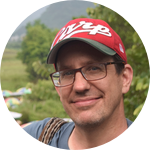
Andrew Crawford
Bogotá, Colombia
Universidad de los Andes
Associate Professor
More
I have spent my entire career seeking, studying, and saving frogs in the rainforests and in the mountains of Costa Rica, Panama, and Colombia. I was born in California, and since 2009 I am a professor at the Universidad de los Andes in Bogotá, Colombia, teaching statistics, genomics, natural history, and amphibian biology. My twin passions are learning more about amphibians and supporting students interested in biodiversity science and conservation. I have advised 53 undergraduate students and 26 graduate students since moving to Colombia, most recently Daniel Vivas, a dedicated young conservationist with a vital project that I hope will provide the world with some good news about the survival of Atelopus. Just like Daniel, I am also a member of the Atelopus Survival Initiative.
My road to Colombia was long but direct. I did my undergraduate work at UC Berkeley with Dr. David Wake, the first person who raised the alarm about amphibian decline as a world-wide problem. Through him, I became obsessed with amphibians and going to see the tropics for myself. After completing my graduate work on Costa Rican ‘dirt frogs’, I spent six years at the Smithsonian Tropical Research Institute in Panama. There I was lucky to collaborate with my friend Dr. Karen Lips, a scientist who bet her nascent career that the amphibian declines witnessed in Central America were caused by a pathogen moving like a slow wave through the mountains. She was right, of course, and we now know that an invasive microscopic fungus caused the horrendous declines of Atelopus. Karen introduced me to the incredible abundance and diversity of amphibians before this pathogen spread everywhere. In the future I want everyone to be able to see what I saw then. Atelopus are greatly declined, but they are not all gone. We need to find out which species are still hiding in the mountains of the Andes so we can take action to bring them back from the brink. Daniel’s work this year will help greatly in this task.
February 2018
Haven't backed any projects yet!
No lab notes posted yet!